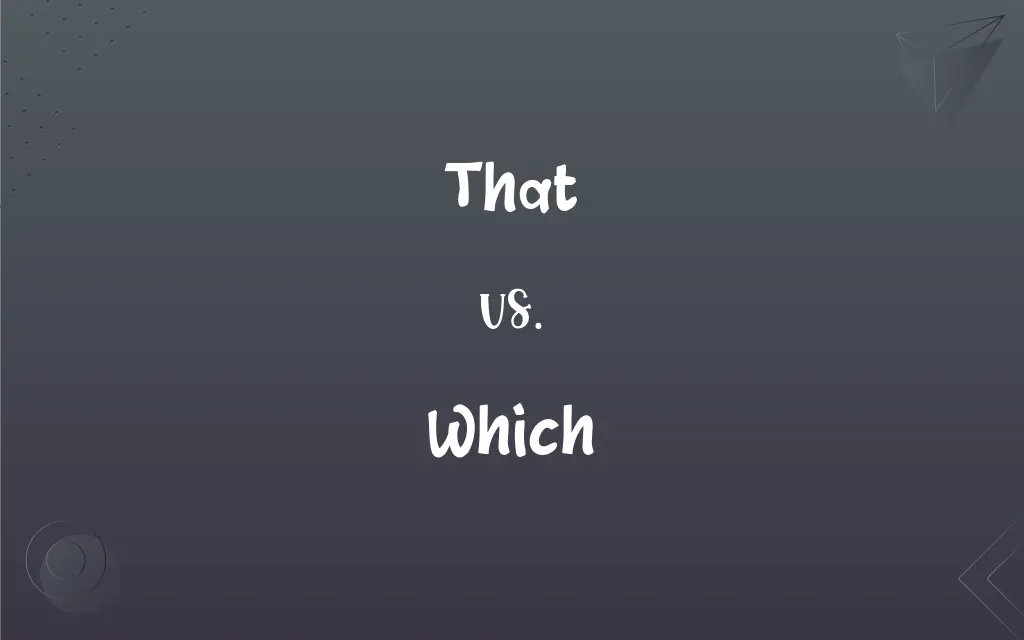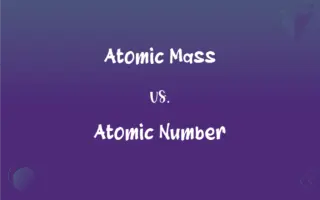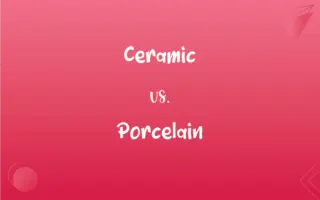That vs. Which: What's the Difference?
Edited by Janet White || By Harlon Moss || Updated on October 25, 2023
"That" introduces essential clauses, while "which" introduces non-essential clauses, often set off by commas.

Key Differences
In English grammar, "that" and "which" serve as relative pronouns, introducing relative clauses. However, the usage and implications of these two words differ. "That" is used to introduce restrictive clauses, which provide essential information about the noun it modifies. In contrast, "which" is often used for non-restrictive clauses, offering additional, non-essential details about a noun.
When using "that," the information following is deemed necessary for the reader's understanding. The omission of this information can change the meaning of the sentence. On the flip side, "which" introduces information that, while informative, can be removed without altering the core meaning of the sentence.
For example, consider the statement: "Books that have hard covers are expensive." Here, "that" indicates a specific subset of books. Alternatively, in "My book, which has a hard cover, is expensive," "which" provides extra information about a specific book already identified. The sentence's core message remains clear even without this detail.
In American English, the distinction between "that" and "which" is rigorously maintained, especially in formal writing. Although "which" can sometimes introduce restrictive clauses, it's generally offset by commas in non-restrictive usage. "That," however, never takes commas in its restrictive function.
In summary, both "that" and "which" introduce relative clauses, but their roles differ. "That" pinpoints essential information, whereas "which" provides supplementary details, often enclosed by commas.
ADVERTISEMENT
Comparison Chart
Type of Clause
Introduces restrictive clauses
Introduces non-restrictive clauses
Essentiality
Essential information
Non-essential, additional information
Commas
Not used with commas
Often used with commas in non-restrictive clauses
Function in Sentence
Specifies and restricts
Provides extra details
Usage in American English
Commonly used for essential clauses
Used for additional information, especially with commas
ADVERTISEMENT
That and Which Definitions
That
"That" can be a demonstrative pronoun indicating a specific item.
I want that one.
Which
"Which" can be used to specify one among several.
She had several pens, one of which was broken.
That
"That" can serve as a conjunction introducing a clause.
I believe that she is honest.
Which
"Which" can refer to a thing previously mentioned.
Out of all the books, this is the one which I liked the most.
That
"That" is a relative pronoun introducing essential information.
The shirt that you bought is blue.
Which
"Which" is a relative pronoun introducing non-essential information.
My car, which is red, needs a wash.
That
"That" can emphasize a certain point or detail.
The cake is not that sweet.
Which
"Which" can be used in questions to offer choices.
Which dress do you prefer?
That
"That" can indicate a particular thing being discussed.
That was a great movie!
Which
"Which" can introduce a specific characteristic.
He told a story, the ending of which was surprising.
That
Being the one singled out, implied, or understood
That place.
Those mountains.
Which
What particular one or ones of a number of things or people
Which part of town do you mean?.
FAQs
When do I use commas with "which"?
Use commas with "which" when introducing non-essential information.
What's the primary role of "that" in a sentence?
"That" often introduces essential information about the noun it modifies.
Do style guides agree on "that" vs. "which"?
Most American style guides emphasize the distinction, but some flexibility exists.
How do I decide between "that" and "which" in complex sentences?
Focus on whether the information is essential and if commas are needed.
Is the distinction between "that" and "which" observed in British English?
British English is more flexible, but formal writing still often observes the distinction.
Can "that" introduce a list?
Yes, when specifying items: "The fruits that I like are apples, oranges, and grapes."
Can "that" and "which" be used for persons?
"Who" is preferred for persons, but "that" can sometimes be used. "Which" isn't used for persons.
Can I use "which" without a comma?
Yes, especially when it introduces essential information, but this is less common.
Can "that" be used in questions?
Not usually; "which" or "who" are often better choices for questions.
Is it acceptable to use "that" after a preposition?
Typically, "which" is used after a preposition, but both can be grammatically correct.
Why do writers sometimes seem to misuse "that" and "which"?
Context, personal style, and regional variations can influence choices, but clarity remains paramount.
Can "that" be used to introduce non-essential information?
Typically, "that" introduces essential, restrictive clauses without commas.
Why is the distinction between "that" and "which" important?
It ensures clarity, specifying whether information is essential or just additional.
What should I prioritize: rules or clarity?
Always prioritize clarity, but knowing the rules helps achieve it.
Are "that" and "which" interchangeable?
In American English, "that" and "which" have distinct roles, especially in formal writing.
Are there exceptions to using "that" and "which"?
Context and clarity are vital; occasionally, "which" might introduce restrictive clauses.
Is "which" only used for non-essential clauses?
Mostly in American English, but it can introduce essential clauses in some contexts.
How do "that" and "which" function in negative sentences?
Their roles remain the same; the context determines the choice.
Is it wrong to use "which" in essential clauses?
It's less common in American English, but clarity is the ultimate goal.
How can I determine if information is essential or non-essential?
If omitting it changes the sentence's meaning, it's essential; otherwise, it's non-essential.
About Author
Written by
Harlon MossHarlon is a seasoned quality moderator and accomplished content writer for Difference Wiki. An alumnus of the prestigious University of California, he earned his degree in Computer Science. Leveraging his academic background, Harlon brings a meticulous and informed perspective to his work, ensuring content accuracy and excellence.
Edited by
Janet WhiteJanet White has been an esteemed writer and blogger for Difference Wiki. Holding a Master's degree in Science and Medical Journalism from the prestigious Boston University, she has consistently demonstrated her expertise and passion for her field. When she's not immersed in her work, Janet relishes her time exercising, delving into a good book, and cherishing moments with friends and family.































































